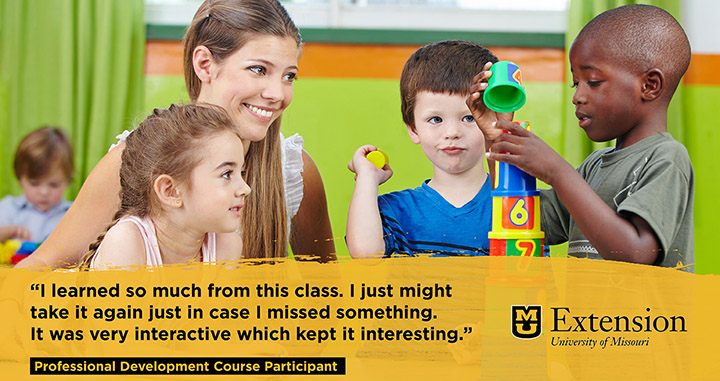Child care provider clock hour trainings
This is the catalog of trainings that we can provide. All trainings are offered in-person or virtual for 2 clock hours unless otherwise noted. Check our Events listing to find and register for current sessions.
Building Strong Families - Communication
Communication is the cornerstone of relationships. It is the main way that people engage with their families and the way by which families create their identities. When family members take the time to really listen to and learn about each other, they discover ways to more effectively communicate. The quality of communication influences the quality and stability of relationships. In addition, it influences children’s problem-solving skills, ability to relate with peers, and their level of emotional distress. Communication includes speaking, writing, reading, listening, comprehending and evaluating. This information is useful for talking with parents, staff, youth and your own family.
Engaging with Families and Support Networks
In this training participants will discuss the importance of engaging with families and support networks in inclusive and meaningful ways and identify the barriers to effective engagement on both sides. Learning activities include poll questions, small group discussions, and case scenarios. Participants will leave the training with handouts reinforcing the material which can be used at the programmatic level to review the current state of effective engagement.
Ouch! That Stereotype Hurts
This is an interactive session that enables participants to identify stereotypes while building confidence and skills to speak up when they encounter biased comments. Learn six key strategies for communication recovery skills to communicate respectfully in this diverse world. These strategies are equally effective in the workplace, at the family dinner table, at a social gathering, or at a community event.
Sowing and Growing Hope in Early Childhood
The theme of this program is Hope. This session will focus on learning the science behind hope, creating a culture of hope in the classroom, and how to create a foundation of hope in early childhood.
Supporting Children's Grief in Early Childhood Programs
This program provides participants with knowledge and skills to proactively meet needs of children and families in the early childhood setting related to grief. The program will define death, grief, ambiguous loss, and myths around children and grief. Participants will learn how to recognize behavior patterns in young children related to grief and loss. Throughout the program participants will learn to implement strategies to support bereaved youth and families in early childhood settings.
The Power of Play
Participants will learn the importance of play for children's development and be able to identify specific skills that are developed through play. We will discuss bias related to what children play with and how they express themselves. Participants will learn actionable steps they can take to create an inclusive environment for children to learn through play.
Youth Mental Health First Aid (2nd Edition) (In-person only, 6.5 clock hours)
Youth Mental Health First Aid is designed to teach parents, family members, caregivers, teachers, school staff, peers, neighbors, health and human services workers, and other caring citizens how to help an adolescent (age 12- 18) who is experiencing a mental health or addictions challenge or is in crisis. Youth Mental Health First Aid is primarily designed for adults who regularly interact with young people. The course introduces common mental health challenges for youth, reviews typical adolescent development, and teaches a 5-step action plan for how to help young people in both crisis and non-crisis situations. Topics covered include anxiety, depression, substance use, disorders in which psychosis may occur, disruptive behavior disorders (including AD/HD), and eating disorders.
